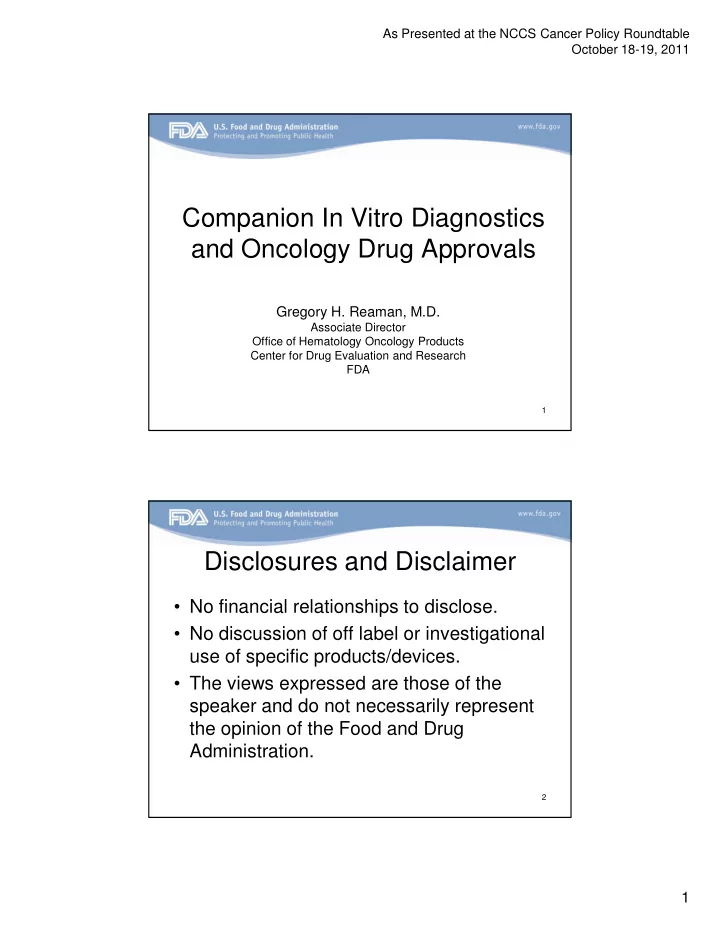

As Presented at the NCCS Cancer Policy Roundtable October 18-19, 2011 Companion In Vitro Diagnostics and Oncology Drug Approvals Gregory H. Reaman, M.D. Associate Director Office of Hematology Oncology Products Center for Drug Evaluation and Research FDA 1 Disclosures and Disclaimer • No financial relationships to disclose. • No discussion of off label or investigational use of specific products/devices. • The views expressed are those of the speaker and do not necessarily represent the opinion of the Food and Drug Administration. 2 1
As Presented at the NCCS Cancer Policy Roundtable October 18-19, 2011 Outline • Regulation of Investigational Use Devices • In Vitro Companion Diagnostic Devices: – Definition – Review and approval of IVD Companion Diagnostic Devices – Coordinated development with new therapeutic products – Recent examples 3 In Vitro Diagnostic Products: Regulation • Research use • Investigational use • Diagnostic use • Review program for human subject studies: Investigational Devices Exemption (IDE) 4 2
As Presented at the NCCS Cancer Policy Roundtable October 18-19, 2011 IDE Review • Patient safety; risk-benefit • Knowledge to be gained from investigation: clinical impact • Alignment with plans for later development and FDA review – Eligibility – Population enrichment – Therapeutic intervention decision-making 5 Investigational Device Requirements for Clinical Trial • Fully specified device • Adequate assessment of analytical performance – Analytes, reagents, equipment, software • Instructions • Clinical/preclinical data to justify exposure • Testable hypothesis 6 3
As Presented at the NCCS Cancer Policy Roundtable October 18-19, 2011 In-vitro Diagnostic Device • Provides information that is essential for the safe and effective use of a therapeutic product. Its use with a particular product is stipulated in the label of both the device and product as well as any generic equivalents. – Identify patients most likely to benefit – Identify patients at increased risk for adverse reactions – Monitor treatment response 7 Review and Approval • Novel therapeutic product – contemporaneous development • Delayed IVD Companion Diagnostic Device review and approval – subsequent labeling changes – New products for life-threatening conditions – Already approved products – safety issue, not supplemental indication 8 4
As Presented at the NCCS Cancer Policy Roundtable October 18-19, 2011 Concept for Co-development • Scientifically robust and efficient development plans and regulatory review and approval for in-vitro diagnostics and drug and biologic products • Inter-center coordination: CDER, CBER, CDRH • Co-development does not mean that drug and diagnostic products cannot be marketed separately 9 Cont’d • Prevent scientific/technological issues associated with one product from negatively impacting development of the other • Early discussion between sponsor, manufacturer, and review centers (pre- IND, IDE process) encouraged. 10 5
As Presented at the NCCS Cancer Policy Roundtable October 18-19, 2011 2 Recent Proofs of Principle • Crizotinib (Xalkori) in ALK+ lung cancer • Vemurafenib (Zelboraf) in V 600E BRAF mutant melanoma • Early co-development for population enrichment • Accelerated time-lines • Early expectation that these examples will be the rule rather than the exception. 11 6
Recommend
More recommend